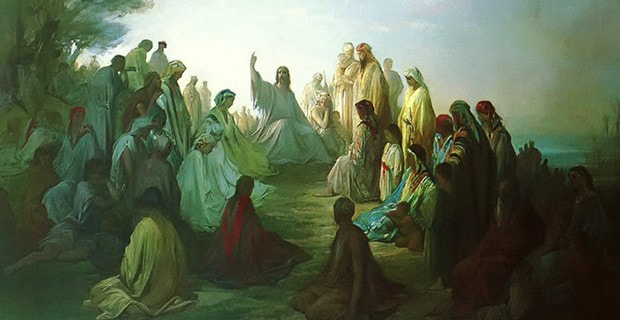"We know that Thou art a Teacher come from God: for no man can do these miracles that Thou doest, except God be with him." — Joh_3:2.
For he taught them as one having authority, and not as the scribes.
Mat 7:29
For he taught them as one having authority, and not as the scribes.
Mat 7:29
THERE WAS NO doubt that Christ was a Teacher come from God.
Some teachers come evidently enough from man; they speak only of earthly things; their speeches are full of quotations; they imitate, in voice, manner, and method of stating truth, some commanding human teacher at whose feet they have sat. But there was a freshness, a self-witnessing truthfulness, a depth, an authority in the words of the Master, which bore the mint-mark of Deity. Our Lord addressed Nicodemus as "the teacher of Israel" (Joh_5:10 R.V.).
Jesus taught with authority (Mat_7:29). This was the verdict of the people. He needed not to quote Gamaliel or Hillel, because the conscience of His hearers said, He speaks the truth. He taught with tenderness and sweetness (Luk_4:22). To those who resisted His words, as the Pharisees did, His tongue was a sharp two-edged sword; but for the sinful, weary, and heavy-laden, grace was poured on His lips. He taught with plenty of illustrations (Mar_4:34). From all quarters He gathered them, from the sky and the earth, from the vulture and the sparrow, from the lightning-flash and the sunrise, from the household candle and the temple lamp, from the woman's dough and the ripened corn, from the children's games and the housewife's jewelry, from the feasts of the rich and the bare larder of the poor. How picturesque and beautiful His talk was! The apples of gold were in pictures of silver. His speech was full of windows through which the light poured. What wonder that the people thronged around Him, and hung with absorbing interest on His words.
But we must come to Him as Saviour. Before we can understand His teaching, we must be converted, and become as little children. To us, He says, as to Nicodemus, "Ye must be born again." To reverence Him as "Teacher" will not avail, until the soul has cast itself in the dust before Him, crying, "Have mercy upon me"; for "I am a sinful man, O Lord."
There is a marked gradation in the Teaching of Jesus. He began by speaking about earthly things, and led His disciples on to understand heavenly things. He gave milk to babes, but to those of understanding, hard and deep things, as strong meat. How differently He taught the woman at Sychar's well, and the disciples in the upper room. (Our Daily Walk)
Some teachers come evidently enough from man; they speak only of earthly things; their speeches are full of quotations; they imitate, in voice, manner, and method of stating truth, some commanding human teacher at whose feet they have sat. But there was a freshness, a self-witnessing truthfulness, a depth, an authority in the words of the Master, which bore the mint-mark of Deity. Our Lord addressed Nicodemus as "the teacher of Israel" (Joh_5:10 R.V.).
Jesus taught with authority (Mat_7:29). This was the verdict of the people. He needed not to quote Gamaliel or Hillel, because the conscience of His hearers said, He speaks the truth. He taught with tenderness and sweetness (Luk_4:22). To those who resisted His words, as the Pharisees did, His tongue was a sharp two-edged sword; but for the sinful, weary, and heavy-laden, grace was poured on His lips. He taught with plenty of illustrations (Mar_4:34). From all quarters He gathered them, from the sky and the earth, from the vulture and the sparrow, from the lightning-flash and the sunrise, from the household candle and the temple lamp, from the woman's dough and the ripened corn, from the children's games and the housewife's jewelry, from the feasts of the rich and the bare larder of the poor. How picturesque and beautiful His talk was! The apples of gold were in pictures of silver. His speech was full of windows through which the light poured. What wonder that the people thronged around Him, and hung with absorbing interest on His words.
But we must come to Him as Saviour. Before we can understand His teaching, we must be converted, and become as little children. To us, He says, as to Nicodemus, "Ye must be born again." To reverence Him as "Teacher" will not avail, until the soul has cast itself in the dust before Him, crying, "Have mercy upon me"; for "I am a sinful man, O Lord."
There is a marked gradation in the Teaching of Jesus. He began by speaking about earthly things, and led His disciples on to understand heavenly things. He gave milk to babes, but to those of understanding, hard and deep things, as strong meat. How differently He taught the woman at Sychar's well, and the disciples in the upper room. (Our Daily Walk)
The Authority of Jesus
This was the impression made by our Lord on those who heard Him teach and preach. He spoke as if He had a right to be heard, as if He had a message to deliver, as if His declaration of the truth were enough.
Just what distinguishes our Lord’s teaching from the teaching of uninspired teachers distinguishes the Bible from all other books. It speaks with authority. Other books may teach the truth; other books may give precepts of holiness, may give examples of excellence; other books may set before us the loftiest, the purest ideas—may demonstrate the truth of their teaching by unanswerable arguments. But the characteristic of the Bible is not merely the truth which it teaches, the examples which it holds before the eyes, the ideals of life which it compels us to revere; but, beyond all these, the love of supreme authority with which it speaks. It is not merely that the Bible claims this authority; it compels the conscience to allow the claim. It speaks with authority, and it speaks with power.
Whence came this authority and this power? What do we mean by our conscious, and still more by our unconscious, acknowledgment of it? We mean that it is overshadowed by the presence of God. Just as the religious man is distinguished from the man of high moral character, and from the man of excellent natural graces, by the ever-present sense of a relation to God running through all his life, just so the Bible is unlike all other books, because it always seems to take us at once into God’s presence. Not by any means that it professes to be, or seems as if it were, dictated by God Himself. No, plainly enough, it is written in human language: the thoughts are human thoughts; it is stirred by human feelings; it is addressed to human understandings. It is as thoroughly human as our Lord was man. But there is brooding over it, there is dwelling in it, a Divine authority which makes it quite unlike anything else which the world has seen. It lays hold of the conscience as nothing else has ever done, nothing else can do. It speaks with an authority which other teachers cannot claim.
Bishop Temple, Rugby Sermons, 2nd series
Just what distinguishes our Lord’s teaching from the teaching of uninspired teachers distinguishes the Bible from all other books. It speaks with authority. Other books may teach the truth; other books may give precepts of holiness, may give examples of excellence; other books may set before us the loftiest, the purest ideas—may demonstrate the truth of their teaching by unanswerable arguments. But the characteristic of the Bible is not merely the truth which it teaches, the examples which it holds before the eyes, the ideals of life which it compels us to revere; but, beyond all these, the love of supreme authority with which it speaks. It is not merely that the Bible claims this authority; it compels the conscience to allow the claim. It speaks with authority, and it speaks with power.
Whence came this authority and this power? What do we mean by our conscious, and still more by our unconscious, acknowledgment of it? We mean that it is overshadowed by the presence of God. Just as the religious man is distinguished from the man of high moral character, and from the man of excellent natural graces, by the ever-present sense of a relation to God running through all his life, just so the Bible is unlike all other books, because it always seems to take us at once into God’s presence. Not by any means that it professes to be, or seems as if it were, dictated by God Himself. No, plainly enough, it is written in human language: the thoughts are human thoughts; it is stirred by human feelings; it is addressed to human understandings. It is as thoroughly human as our Lord was man. But there is brooding over it, there is dwelling in it, a Divine authority which makes it quite unlike anything else which the world has seen. It lays hold of the conscience as nothing else has ever done, nothing else can do. It speaks with an authority which other teachers cannot claim.
Bishop Temple, Rugby Sermons, 2nd series
BUILDING ON SECURE FOUNDATIONS
In the Syrian summer, when the soil is baked hard by the intense heat, any spot will serve equally well as the site of a house. No one can say whether his neighbor has built well or ill-only the builder knows. But in the winter the rain falls in torrents and the valleys are filled with foaming floods, which sap all foundations that have not gripped the living rock.
To believe about Christ is not enough; we must believe in Him. We must come to Him as a Living Stone and become living stones, 1Pe_2:4-8. We must not only listen to Him; we must obey Him. There must be living, unbroken unity and fellowship between Him and us. Then we may proceed to erect the structure of godly and holy living which shall grow into a holy temple in the Lord, 1Co_3:10-15. May we receive, with meekness, the engrafting of the Word, which is able to save the soul. (F.B. Meyer)
To believe about Christ is not enough; we must believe in Him. We must come to Him as a Living Stone and become living stones, 1Pe_2:4-8. We must not only listen to Him; we must obey Him. There must be living, unbroken unity and fellowship between Him and us. Then we may proceed to erect the structure of godly and holy living which shall grow into a holy temple in the Lord, 1Co_3:10-15. May we receive, with meekness, the engrafting of the Word, which is able to save the soul. (F.B. Meyer)








